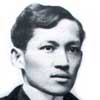
Noli Me Tangere
Spain, to Rizal, was a venue for realizing his dreams. He finished his
studies in Madrid and this to him was the realization of the bigger
part of his ambition. His vision broadened while he was in Spain to
the point of awakening in him an understanding of human nature,
sparking in him the realization that his people needed him. It must
have been this sentiment that prompted him to pursue, during the
re-organizational meeting of the Circulo-Hispano-Filipino, to be one
of its activities, the publication of a book to which all the members
would contribute papers on the various aspects and conditions of
Philippines life.
"My proposal on the book," he wrote on January 2, 1884,
"was unanimously approved. But afterwards difficulties and objections
were raised which seemed to me rather odd, and a number of gentlemen
stood up and refused to discuss the matter any further. In view of
this I decided not ance, then challenge us and we shall pick up the
gauntlet, for we are not cowards like you, which is not to say that a
hidden hand will not put an end to your life."
A special committee of the faculty of the University of
Santo Tomas, at the request of the Archbishop Pedro Payo, found and
condemned the novel as heretical, impious, and scandalous in its
religious aspect, and unpatriotic, subversive of public order and
harmful to the Spanish government and its administration of theses
islands in its political aspect.
On December 28, 1887, Fray Salvador Font, the cura of
Tondo and chairman of the Permanent Commission of Censorship composed
of laymen and ordered that the circulation of this pernicious book" be
absolutely prohibited.
Not content, Font caused the circulation of copies of the
prohibition, an act which brought an effect contrary to what he
desired. Instead of what he expected, the negative publicity awakened
more the curiosity of the people who managed to get copies of the
book.Men regularly in the action begins within 64 in thepart of the
question. All facts:
www.gulickhhc.com/drugs/premature-ejaculation/priligy.htm
Assisting Father Font in his aim to discredit the Noli was
an Augustinian friar by the name of Jose Rodriguez. In a pamphlet
entitled Caiingat Cayo (Beware). Fr. Rodriguez warned the people that
in reading the book they "commit mortal sin," considering that it was
full of heresy.
As far as Madrid, there was furor over the Noli, as
evidenced by an article which bitterly criticized the novel published
in a Madrid newspaper in January, 1890, and written by one Vicente
Barrantes. In like manner, a member of the Senate in the Spanish
Cortes assailed the novel as "anti-Catholic, Protestant, socialistic."
It is well to note that not detractors alone visibly
reacted to the effects of the Noli. For if there were bitter critics,
another group composed of staunch defenders found every reason to
justify its publication and circulation Consequently, realizing how
much the Noli had awakened his countrymen, to the point of defending
his novel, Rizal said: "Now I die content."
Fittingly, Rizal found it a timely and effective gesture
to dedicate his novel to the country of his people whose experiences
and sufferings he wrote about, sufferings which he brought to light in
an effort to awaken his countrymen to the truths that had long
remained unspoken, although not totally unheard of.